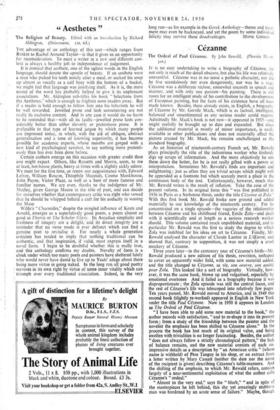Tile advantage of an anthology of this sort—which ranges from
Ruskin to Rachel Annand Taylor—is that it gives us an opportunity for reconsideration. To meet a writer in a new and different con- 'text is always a healthy jolt to independence of judgement.
It is ironical that aesthete, one of the ugliest words in the English language, should denote the apostle of beauty. If an aesthete were a man who picked his teeth noisily after a meal, or sucked his soup up almost as vocally as a calf busy with the bottom of a bucket, we might feel that language was justifying itself. As it is, the mere sound of the word has probably helped to give it its unpleasant associations. Mr. Aldington sub-titles his book "Selections from the Aesthetes," which is enough to frighten most readers away. But if a reader is bold enough to follow him into his labyrinth he will be well rewarded. Jewelled prose and lush sonneteering are not really its exclusive content. And in any case it would do no harm to be reminded that—with all its faults—jewelled prose lasts con- siderably better than either slovenly or pretentious prose. It is preferable to that type of learned jargon by which many people are impressed today, in which, with the aid of oblique, abstract generalisation and a tone of knowing superiority, it has become possible for academic experts, whose mouths are gorged with a new kind of psychological sawdust, to say nothing more pretenti- ously than has ever been clone before.
Certain authors emerge on this occasion with greater credit than one might expect. Others, like Rossetti and Morris, seem, to me at least, hot-house plants, heavy at times with a slightly sickly odour. We meet for the first time, or renew our acquaintance with, Edward Lefroy, William Roscoe, Theophile Mazzials, Cosmo Monkhouse, John Payne, Victor Plazz, as well as a host of more famous and familiar names. We are even, thanks to the indulgence of Mr. Medley, given George Moore in the role of poet, and can decide for ourselves whether that contemporary critic was right who vowed that he should be whipped behind a cart for his audacity in wooing the Muse.
Willie's " Charmides," despite the mingled influence of Keats and Arnold, emerges as a superlatively good poem, a poem almost as good as Thyrsis or The Scholar Gipsy. Its Arcadian simplicity and freshness of imagery are a delight, and its direct integrity are a reminder that no verse mode is ever defunct which can find a genuine poet to revitalise it. For nearly a whole generation criticism has tended to imply that nothing traditional can be authentic, and that inspiration, if valid, must express itself in a novel form. I begin to be doubtful whether this is really true, and this anthology confirms my doubts. Novelty of form is a cliiak under which too many poets and painters have sheltered lately who would never have dared to live up to Yeats' adage about there being more virtue in going naked. In the long run all good poetry survives in its own right by virtue of some inner vitality which can ' triumph over every traditional association. Indeed, in the very long run—as for example in the Greek Anthology—theme and treat. ment may even be hackneyed, and yet the poem by some individual felicity may survive these disadvantages. MONK GIBBON.














































































 Previous page
Previous page